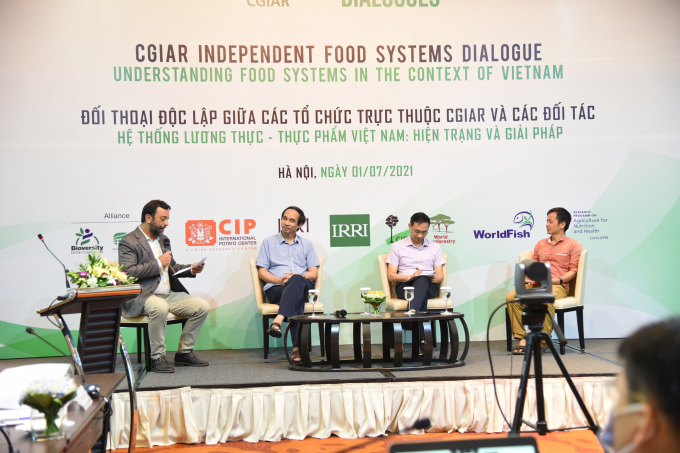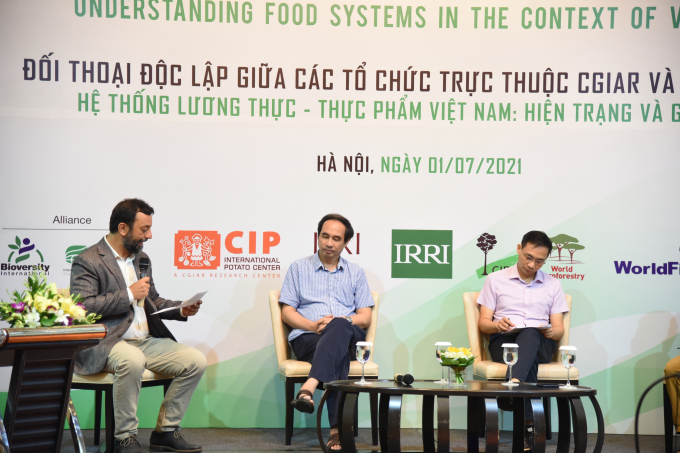November 28, 2025 | 01:25 GMT +7
November 28, 2025 | 01:25 GMT +7
Hotline: 0913.378.918
November 28, 2025 | 01:25 GMT +7
Hotline: 0913.378.918

CGIAR leads a food systems dialogue with cross-sector stakeholders in Vietnam.
The CGIAR-led meeting brings together key people from state agencies, academia, NGOs, donor agencies and industry to help address existing and emerging challenges and opportunities in Vietnam's agri-food systems and inform policies and investments ahead of the United Nations Food Systems Summit. The meeting is being led by CGIAR in Hanoi.
As world leaders, movers, and activists prepare for the United Nations Food Systems Summit (UNFSS) in September 2021, countries are gathering evidence and identifying key solutions to pressing issues in their local food systems. In June, CGIAR centres participated and contributed to a series of the Ministry of Agriculture and Rural Development (MARD)-convened dialogues that are organized at national and sub-national levels.
This independent dialogue is another effort by CGIAR centres in Vietnam to enhance the awareness of key stakeholders engaged in the National Food Systems Dialogue about the potential contribution of CGIAR to achieve responsible, accountable, sustainable and resilient food systems in Vietnam.
The dialogue also seeks to facilitate conversations with partners to identify the way forward on how CGIAR and partners can work together to better address the needs and priorities identified by national partners and policy makers for achieving sustainable and resilient food systems in the country. Vietnam's food systems are diverse and facing many challenges.
Global climate change forecasts and reality in recent years show that Vietnam is one of the countries most heavily affected by the changing climate. Vietnam needs to take specific actions to promote cooperation, synergizing with external forces to support the formation and development of smart and resilient food systems, ensuring food safety.
Food security and nutrition not only for nearly 100 million Vietnamese people but also contribute to ensuring world food security, especially in the context of the complicated development of the Covid-19 pandemic.
The CGIAR has been working extensively in various initiatives around Vietnam, ranging from agriculture, nutrition and diets, One Health and climate issues-and more recently contributing to COVID-19 initiatives. 10 out of 15 CGIAR are operating in Vietnam.
Among those, the Alliance of Bioversity International and CIAT, the International Potato Center (CIP), the World Agroforestry (ICRAF), the International Livestock Research Institute (ILRI), WorldFish, and the International Rice Research Institute (IRRI) contributed substantially to this dialogue.
Dao The Anh, vice president of the Vietnam Academy of Agricultural Sciences (VAAS), said that research by CGIAR in Vietnam has contributed to the growth of the country’s agriculture sector, with many of them Page 2 of 3 contributing to improving the sustainability of food systems of Vietnam using a multidisciplinary and integrated approach.
Jean Balié, CGIAR regional director for Southeast Asia and the Pacific emphasizes the significance of transforming agri-food systems in the region toward improved environmental, economic and social sustainability as well as climate resilience. The unified and comprehensive efforts of the CGIAR in Vietnam aims to support the country to achieve this profound and urgent transformation of food systems within planetary boundaries while keeping sight of national socio-economic development targets”. said Balié.

The longstanding work of the CGIAR with national and local authorities and partners in Vietnam contributed to addressing different constraints and opportunities in various levels of the food system in the country.
The longstanding work of the CGIAR with national and local authorities and partners in Vietnam contributed to addressing different constraints and opportunities in various levels of the food system in the country. Stephan Weise, managing director for Asia of the Alliance says, we are honored to contribute to the Food Systems Summit through this dialogue and remain committed to supporting actions towards ever more sustainable food systems in Vietnam. Now is the time to work across sectors and themes in an integrated manner at the local through to the national level.
In this dialogue partners will focus on discussing the following key issues under the light of the UN five actions tracks of safe and nutritious food, sustainable consumption patterns, nature-positive production, advance equitable livelihoods, and resilience to vulnerabilities, shocks, and stress.

(VAN) On November 27, in the meeting with Minister Tran Duc Thang, Mayor Yin Yong shared Beijing’s experience to improve environment and air quality.

(VAN) After 30 years, both sides identified strategic areas of cooperation: sustainable production, increasing coffee value and training for farmers.
/2025/11/27/4910-4-164708_294.jpg)
(VAN) On the afternoon of November 27 in Beijing, Minister of Agriculture and Environment Tran Duc Thang held a working session with several major Chinese enterprises operating in the agriculture and environment sector.

(VAN) The Department of Animal Health issued a provisional guideline requesting local authorities to increase surveillance, collect samples for testing, and conduct epidemiological investigations according to the established procedure.

(VAN) The United Nations recommends that Vietnam utilize data and artificial intelligence to enhance early disaster warnings and reduce GDP losses by 3.2% in the context of climate change.

(VAN) On the morning of November 27 in Beijing, Minister Tran Duc Thang and the Deputy Commissioner General of the General Administration of Customs of China signed a protocol on fresh jackfruit exports.

(VAN) As floodwaters recede, a vast network of irrigation works across eastern Gia Lai is emerging in a state of severe disrepair, with extensive damage demanding urgent restoration ahead of the 2025-2026 winter-spring cropping season.